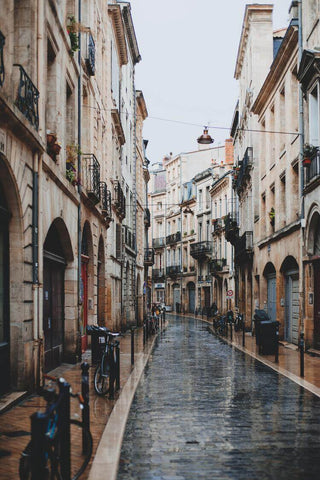
Pasta, the Louvre, picturesque canals….have your heart set on Europe for your first post-COVID travels? Here are some nuggets of wisdom that make it all the more interesting.
🚶 Many of the older city centers are actually quite walkable, and most of the attractions are just a few miles apart.
Contrary to what many people think, Europe is a very walkable continent. In many of the old city centers, the best way to explore is on foot: from one sight or museum to the next. Public transport is available, but walking is often faster and it’s a great way to see more of your destination. For example in Florence, Italy’s Duomo, Uffizi Art Gallery and Ponte Vecchio are all just five minutes apart. Just make sure you wear comfortable shoes!

💳 You'll need to carry your ID at all times.
…And if you don’t, it can be a pain in the neck!
If you’ve gone on vacation to the United States or Canada, you probably haven’t had to carry around ID for any reason other than checking into your hotel and maybe renting a car. In Europe though? It would be smarter not to leave home without it! It really depends on where you travel – while most countries require that you have identification on you at all times (some even have laws requiring it), there are some that are more relaxed about this than others. What matters more is how strictly it is enforced in each place. So to avoid being turned away at bars and other places where alcohol is served, it’s best to just keep it on you.
🚌 When it comes to travelling like a local, you'll find that there are more than just public transportation options available.
Just planning how you’re getting around can set the tone to how you would like to see and experience Europe!
In Rome, the city of two wheels, rental bikes and scooters are everywhere. In Paris, you can hop on a Vélib' - a cheap bike-share program. And in London, you can rent a Santander Cycles (nicknamed Boris Bikes) and pedal around the city.
In some cities like Amsterdam and Copenhagen (not to mention German and Dutch cities), bikes are the preferred way to get around. So if you don't mind sweating a little bit or getting caught in the rain you can definitely travel like a local by hopping on a bicycle.
And if you prefer something a little faster? Scooter or Vespa rentals are available in many European countries. But be careful - some countries require you to have a motorcycle license to rent one! If biking is not your thing, renting your own car is also an option in most European countries. Just keep in mind that driving habits vary from country to country so make sure that:
A.) You know what kind of traffic laws there are beforehand and
B.) Be prepared for very narrow streets and cobblestones in older cities!
C.) Study the city maps beforehand so you’re not caught off guard
🚂 Some countries set aside specific seats for locals on trains.

On a train? Some countries, including the Netherlands and France, have specific seats reserved for the locals. This is to ensure that they can get to work on time (or even just get home) without having their commute made difficult by tourists and travellers occupying all of the free seats. Make sure you’re not sitting in a reserved seat at all times, and if you are, prepare to get some less than favourable looks from passengers—and you could even find yourself facing a fine from the police.
In general, Europeans have a keen sense of spatial awareness and civic orderliness, so be considerate of all travellers around you wherever you go (no sudden stops
while walking in crowded areas, always stand on the left side of escalators, be mindful of how loud you’re talking in public areas, etc.).
💸 Some countries will require paying for things in cash, not plastic, so come prepared!

Whether you're going from one end of Europe to the other, or just visiting a few countries, it's important to note that some places will require you to pay for things in cash. Even if your credit card does not charge foreign transaction fees, you may still find yourself paying for public restrooms and small things at roadside stands with coins.
There are two ways to get cash abroad: exchanging currency and getting money from an ATM.
When choosing an exchange service, be sure that they don't charge an exorbitant fee (some banks and exchange services will charge up to 15%!) when they convert your dollars into foreign currency. If you do get charged a fee but can't avoid it, make sure the amount being exchanged is worth it—wouldn't want to waste money on something small because of a big fee. And if you plan on withdrawing money from an ATM abroad, be sure that the bank won't nickel-and-dime you with fees every time you use their machine. You'll want to check beforehand so you can be prepared for any extra charges!

🙋 It’s possible to find great deals on attractions
Reluctant but half expecting to splurge? Contrary to what you might, think ,you can opt out of paying full price for some of the world’s most popular attractions. You can find great deals on some of your favorite sites by checking voucher websites such as Groupon, or googling the attraction name with “discount” after it. Prices are often lower during off-season, and you can also find discounts on city passes that include museum entry fees. A great way to start by checking your destination’s tourism website for deals as well!

🗼 The best way to experience Europe is by tapping into its rich cultural history with open-mindedness, curiosity & courtesy
- In the throngs of a pandemic, travelling through Europe might have a different feeling to what you had always imagined (there may be significantly less kissing and hugging in the streets of Italy!) - but don’t let that deter you from experiencing the beauty of it all as it is. Just be understanding that the world is going through a strange time and readjustments are underway.
- Know the customs of the local people. Before you travel, look up what types of things to avoid or how you can make a good impression on locals and always be respectful and courteous no matter where you go.
- Try to interact with locals—even if you don't speak the same language! Ask for advice on where to eat or drink and ask about cultural traditions that are important to them. Be wary of tourist traps though— try to stick with places where locals tend to go instead of big chains or restaurants that target tourists specifically (TikTok is a great resource for latest, up-to-th- minute travel guides - read more about that here).
- With so many online forums and social media traveller groups at your fingertips, it couldn’t hurt to join in on some online conversations beforehand to suss out some unwritten rules of the places you’re travelling to - either from a local’s point of view or from someone who has recently visited.
📱 Ensuring you stay connected throughout your travels is the smart thing to do!
In case of emergencies, whether you’ve lost your travel buddies, or if you need consistent access to Google Maps, a travel Sim card is a must. The best part? You can use just ONE travel sim card across different European countries (no need to trouble yourself by fiddling with your phone and swapping around all the time!).
Shop our multi-country Europe Travel Sims here.
Share your travels with us! Be sure to tag us #simcorner #StayConnected |
Follow us on IG: @simcornertravel





